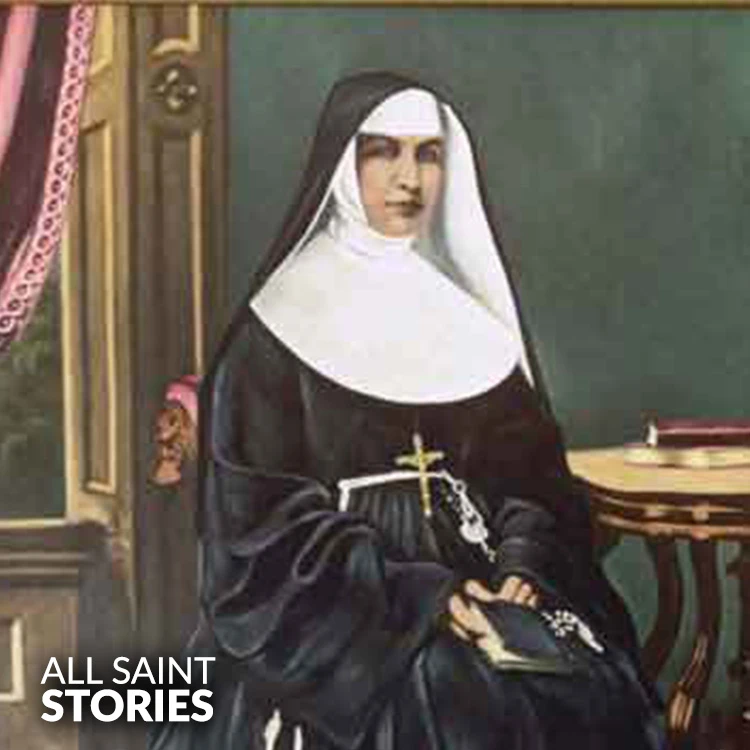St. Marianne Cope, you dedicated your life to the care of those suffering from leprosy and other diseases in Hawaii. You showed extraordinary compassion and courage in the face of immense challenges. Intercede for us that we too may have the strength to serve those in need, to show kindness in difficult circumstances, and to live lives of love and compassion. Amen.
ST. MARIANNE COPE
ST. MARIANNE COPE

St. Marianne Cope was a German-born American Franciscan sister who dedicated her life to caring for the sick, especially those suffering from leprosy in Hawaii. Her selfless service and devotion earned her sainthood in 2012.
St. Marianne Cope was born on January 23, 1838, in Heppenheim, Hesse, Germany. She was baptized Maria Anna Koob, and her family immigrated to the United States when she was a child, settling in Utica, New York. Growing up in a family with eight children, Marianne felt a deep call to the religious life from a young age. Her faith was nurtured within her family and the Catholic Church, and by the time she was in her early twenties, she joined the Sisters of St. Francis in Syracuse, New York, taking the religious name of Sister Marianne.
Marianne’s vocation was one of service, and she soon began working with the sick and the poor. She served in hospitals and orphanages, where she showed great compassion and dedication to the care of those who were most in need. Her commitment to healthcare was extraordinary, and she eventually became known for her work with the marginalized and underserved populations. Throughout her years of service in New York, she was entrusted with leadership roles within her religious community, where she oversaw the establishment of hospitals and care for the poor.
In 1883, Marianne's life took a dramatic turn when she was asked by the Hawaiian government to come to the islands and assist with the care of people suffering from leprosy (Hansen’s disease). Leprosy, which was highly feared and misunderstood at the time, had led to the isolation of those afflicted on the Hawaiian island of Molokai. The disease was highly contagious, and those suffering from it were exiled to a remote leprosy settlement, where they lived in harsh conditions with little support.
Marianne Cope answered this call to serve the most vulnerable without hesitation, knowing that she would be working in dangerous and unknown conditions. She arrived in Hawaii in 1883, where she took on the role of director of the hospital at the Kalaupapa settlement on Molokai. Along with her companions, she worked tirelessly to improve the living conditions of the patients, providing not only medical care but also spiritual and emotional support. The residents of Molokai, who had long suffered in isolation, found great comfort in her presence. Marianne and her fellow sisters dedicated themselves to caring for the sick and dying, without fear of contracting the disease themselves.
In addition to her work at the hospital, Marianne Cope is also remembered for her efforts to advocate for the rights of those with leprosy. She worked to ensure that the patients at Kalaupapa had access to basic necessities, including food, clean water, and proper shelter. Her compassion and dedication to the well-being of the people she cared for made her a beloved figure in the Hawaiian Islands. She was also instrumental in securing funds and resources for the mission in Hawaii, allowing the work to continue for years.
St. Marianne's devotion to the people of Molokai was unwavering, and she remained on the island, dedicating her life to their care until her death on August 9, 1918. She died at the age of 80, having spent the last 35 years of her life in selfless service to those suffering from leprosy. Her work left a lasting impact on the people of Hawaii, and she was mourned deeply by the community she had served.
After her death, St. Marianne Cope's life of service and her extraordinary devotion to the care of those suffering from leprosy did not go unrecognized. She was beatified by Pope Benedict XVI in 2005, and on October 21, 2012, she was canonized as a saint by Pope Benedict XVI, becoming the 11th saint of the Hawaiian Islands. Her canonization recognized her heroic virtue and her selfless service to those most in need.
St. Marianne Cope’s legacy lives on through her work in the healthcare field, her advocacy for the marginalized, and her example of profound love and compassion. She is a symbol of the power of faith to overcome fear and adversity, and she continues to inspire those who work in healthcare and serve the most vulnerable members of society.
Her feast day is celebrated on January 23, the anniversary of her birth, and she is venerated as a patron of those suffering from leprosy, healthcare workers, and all who dedicate their lives to serving the poor and the sick.
Video Not Found
The information on this website is compiled from various trusted sources. While we aim for accuracy, some details may be incomplete or contain discrepancies.
If you notice any errors or have additional information about this saint, please use the form on the left to share your suggestions. Your input helps us improve and maintain reliable content for everyone.
All submissions are reviewed carefully, and your personal details will remain confidential. Thank you for contributing to the accuracy and value of this resource.
Credits & Acknowledgments
- Anudina Visudhar (Malayalam) – Life of Saints for Everyday
by Msgr. Thomas Moothedan, M.A., D.D. - Saint Companions for Each Day
by A. J. M. Mausolfe & J. K. Mausolfe - US Catholic (Faith in Real Life) – Informational articles
- Wikipedia – General reference content and images
- Anastpaul.com – Saint images and reflections
- Pravachaka Sabdam (Malayalam) – Saint-related content and insights
We sincerely thank these authors and platforms for their valuable contributions. If we have unintentionally missed any attribution, please notify us, and we will make the correction promptly.
If you have any suggestion about ST. MARIANNE COPE
Your suggestion will help improve the information about this saint. Your details will not be disclosed anywhere.
© 2026 Copyright @ www.allsaintstories.com




 English
English
 Italian
Italian
 French
French
 Spanish
Spanish
 Malayalam
Malayalam
 Russian
Russian
 Korean
Korean
 Sinhala
Sinhala
 Japanese
Japanese
 Arabic
Arabic
 Portuguese
Portuguese
 Bantu
Bantu
 Greek
Greek
 German
German
 Dutch
Dutch
 Filipino
Filipino